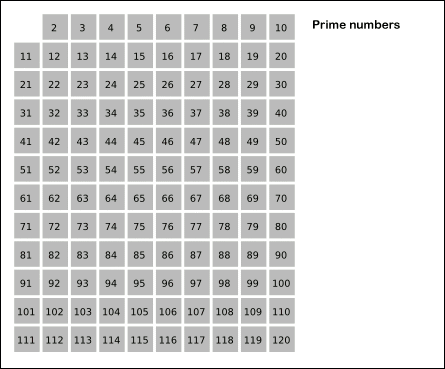The Sieve of Eratosthenes is an algorithm for finding all prime numbers between 2 (the smallest prime number) and a given limit, n. It has a time complexity of O(n log log n). The gist of the algorithm is to mark off all multiples of primes inside this range,leaving only the prime numbers themselves.
The Algorithm
For this example, let n = 10.
Step 1: Create a list of all numbers between 2 and n.
[2, 3, 4, 5, 6, 7, 8, 9, 10]
Step 2: Set p = 2.
Step 3: Mark off all multiples of 2 (excluding 2) until n leaving the following:
[2, 3, 5, 7, 9]
Step 4: Assign the next smallest number that hasn't been marked in the previous operation to p. Repeat from step 3.
In this case, the next p is 3. We can safely assume that number is prime. Marking off multiples of 3, we are left with the following array:
[2, 3, 5, 7]
Step 5: If there isn't any number left that hasn't been marked off, the algorithm is done. The unmarked numbers are the primes between 2 and n, inclusive. Our final output is:
[2, 3, 5, 7]
The Code
Here are a few test cases to check that our implementation does what it's supposed to do. The test setup is Enzyme + Jest.
import { sift } from "../../lib/sieve"
describe("Sieve of Eratosthenes", () => {
test("sift(0) returns an empty array", () => {
expect(sift(0)).toEqual([])
})
test("sift(2) returns [2]", () => {
expect(sift(2)).toEqual([2])
})
test("sift(10) returns all primes less than 10", () => {
expect(sift(10)).toEqual([2, 3, 5, 7])
})
test("sift(11) returns all primes between 2 and 11", () => {
expect(sift(11)).toEqual([2, 3, 5, 7, 11])
})
})
And finally, the implementation:
interface PrimesHash {
[index: number]: boolean
}
export const sift = (limit: number): number[] => {
if (limit === 2) return [2]
// Step 1: create an array from 2..limit inclusive
let allNums: number[] = Array.from({ length: limit - 1 }, (_v, k) => k + 2)
// Step 2: set p = smallest prime
let p = 2
// create a hash of { number: boolean }, from the array created in step 1,
// setting every value to true
let primes: PrimesHash = allNums.reduce((hash: PrimesHash, num: number) => {
hash[num] = true
return hash
}, {})
// Step 4: find the next smallest prime and repeat step 3
while (p <= limit) {
if (primes[p] === true) {
// Step 3: mark off all multiples of p. We start from p*p as
// an optimisation
for (let i = p * p; i <= limit; i += p) {
primes[i] = false
}
}
p++
}
// Step 5: return all unmarked numbers
return Object.keys(primes).reduce((array: number[], key) => {
if (primes[+key] === true) {
array.push(+key)
}
return array
}, [])
}
This was a fun algorithm to implement 🎉.







Top comments (0)